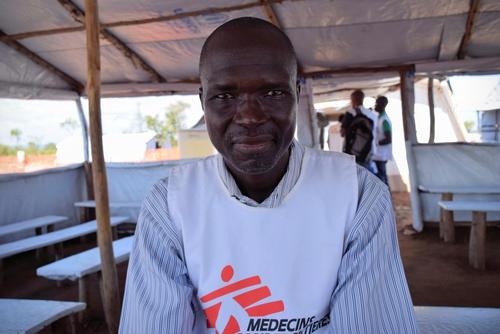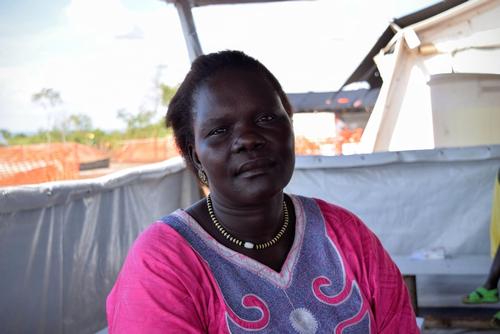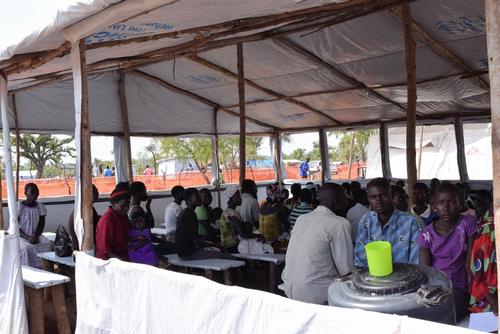Rose, 37 years old, is a refugee from Greater Equatoria region, South Sudan
Rose has come to the MSF outpatient clinic in Bidi Bidi refugee camp in Yumbe, northern Uganda because her son has a fever and has been vomiting and feeling dizzy. She has five children and all of them are sitting in the waiting room with her as they wait to find out what’s wrong with her second eldest. They all arrived in the refugee camp around a month ago. Rose’s husband is a soldier for the South Sudanese government and was sent to Malakal in the northeast of South Sudan after violence erupted there in 2013. She hasn’t had any communication from him since.
I came to Uganda because of the violence in South Sudan. My next door neighbours were dragged from their home by men. They kidnapped my next door neighbour’s husband and took him very far away. They chopped him in to pieces. Then they cut up his wife and threw the body in to a channel of water near our village. They also slit their child’s throat and cut his head in two and placed his body next to his mother’s in the water.
This filled me with fear. I was worried I would be next and I knew I had to take off. The violence continued and other families I knew were taken. I was losing all of my neighbors, so three days later I left with my five children. I have four daughters and one son. So my eleven-year-old son was the only male we had with us for protection. We left on foot without taking any of our things, not even a saucepan.
We walked for three days in the direction of Uganda. Then we ran in to some soldiers hiding in the bush. I was very scared but they saw how tired the children were and they offered to help. They said they could take us a certain distance. We travelled for the fourth day in their car and then the next day we carried on walking until I saw people from the UN carrying people across the border and registering them. They took us the final way to the border and reception centre.
I was given food rations and a tent. We were also given clothes, but I’m still without some really important things. I don’t have cooking utensils and they didn’t give me any jerry cans, so I can’t collect drinking water. I had to ask my neighbour if I could borrow one of their jerry cans, but one can isn’t enough between six of us.
I would not easily walk back into South Sudan and towards death. I ran away from there in fear and I am so relieved I managed to save my and my children’s lives. For now, I am speechless and I’m crying that people will help us. But the only future I can see for myself is here. I will take this land they have offered me in Uganda and settle here.

Richard, 42 years old, from Greater Equatoria Region in South Sudan, is a medical interpreter at the MSF outpatient clinic in Bidi Bidi refugee camp in Yumbe, northern Uganda.
I decided to leave because of the violence. People often stay in their village because a good friend or someone in the community is staying, because it gives them courage. When I told people in my village I was leaving, many decided to follow me. They were frightened that if I was leaving it must be bad. I managed to find someone who had a motorbike and knew the roads who could drive me to the Ugandan border. If you don’t know which way to go, you can easily end up running into rebel or government soldiers and they’ll shoot you.
I was lucky that I had already sent my children to study in Uganda a few years ago but my wife is still stuck in South Sudan. She was working in Juba when the violence started and it was very difficult for her to make the journey here. Roads can get blocked very suddenly without warning. I speak to her regularly and I’m trying to work out how to get her here, but it’s a very stressful situation.
When I arrived in Uganda I was driven to a plot of land I was told was my own. But, around 4pm, some locals came up to me and started questioning what was happening. They weren’t happy. They said it was their land and I had to leave. Later at night, a bigger group of them came back with machetes threatening me and other refugees in the area. We were very afraid and hundreds of us took off on foot back to the reception centre of the refugee camp. Since then, I have met my brother who is also here in the camp. He said I could stay with him but I’ve been told I’ll be given another plot of my own in time.
Before violence broke out in South Sudan I worked in finance for international NGOs. When I arrived here I was desperately looking for something to do. I would go to the reception site every morning looking for work and one day I saw an MSF driver waiting outside. He explained MSF were just about to set up a clinic here. I said “It’s better to eat an egg today that’s at hand, than a hen tomorrow. A hen may never arrive tomorrow. I will take any work.” They asked if I could interpret for them and I said “of course! Never mind about my profession. Now, I need to survive.”
Most of our patients here have malaria. People are sleeping outside or have nowhere to hang the mosquito nets that have been distributed. There is also a lot of diarrhoea. People are neglecting the basics, cutting back on food and water, because they’re in a desperate situation and then they fall ill.
Even so, people here are not interested in going home. They tried leaving their homes in South Sudan and hiding in the bush but armed men still came and found them there and slaughtered them. They know that even if the violence stops now, one day it will start again. As for me, I’m not going anywhere. I’m trying to work hard so that I have enough money to keep my children in school and I pray my wife will be able to join us soon.





